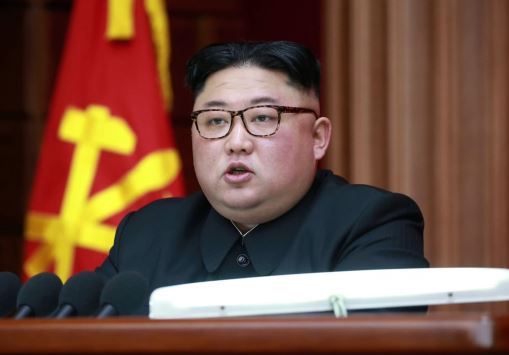North Korean leader Kim Jong-un has been re-elected as chairman of the State Affairs Commission, the communist state's highest seat of power, in a key parliamentary meeting, state media reported Friday.
The North's Premier Pak Pong-ju has also been replaced with Kim Jae-ryong, a senior member of the ruling Workers' Party of Korea, during the first session of the 14th Supreme People's Assembly on Thursday, the Korean Central News Agency said.
"The election of the Supreme Leader as chairman of the State Affairs Commission of the DPRK is the great political event of crucial historical significance," the KCNA said.
 |
(Yonhap) |
Kim was elected to the post first in June 2016, when the commission was created through an amendment to the constitution. Though it has been only three years since the election, his new five-year term should technically start with the beginning of the newly formed parliament.
Chinese President Xi Jinping sent a congratulatory message for Kim's re-election, emphasizing the friendly ties between the two neighbors, according to the Xinhua news agency.
Thursday's session drew keen attention as it would determine the new makeup of the country's leadership. The latest personnel reshuffle appears to be aimed at consolidating Kim's power.
In the parliamentary meeting, North Korea's nominal head of state, Kim Yong-nam, was replaced by Choe Ryong-hae. The 91-year-old Kim had served as president of the Presidium of the SPA since 1998.
Choe, known as No. 2 and a close aide to leader Kim, will also take the post of first vice chairman of the SAC, apparently bolstering his influence on the country's diplomacy. Under his wing come top nuclear negotiator Kim Yong-chol and others involved in February's summit with the US, who were elected to members of the SAC.
Experts see the North's latest personnel reshuffle as focusing on strengthening the lineup of its nuclear negotiating team in preparations for future talks with Washington on its nuclear weapons program.
"This appears to reflect leader Kim's intention to actively pursue negotiations with the US aimed at easing sanctions going forward," Cheong Seong-chang, vice president at the Sejong Institute think tank, said.
The summit in Hanoi fell apart as North Korean leader Kim and US President Donald Trump failed to find common ground over how to match Pyongyang's denuclearization steps with Washington's sanctions relief.
Pyongyang wanted major sanctions relief in exchange for dismantling its Yongbyon nuclear facility. But Washington insisted on what officials described as "a big deal" that called for trading sanctions relief for the dismantlement of all of the North's nuclear and other weapons programs.
During key party meetings held ahead of the parliamentary session, Kim stressed the importance of "self-reliance" repeatedly and urged his people to follow through on the party's strategic line of economic development.
He mentioned his second summit with Trump in late February but steered clear of criticism directly pointed at Washington or his country's nuclear program.
Thursday's parliamentary meeting coincided with summit talks between South Korean President Moon Jae-in and US President Donald Trump in Washington on Thursday (local time).
The two shared the need for maintaining dialogue with North Korea to peacefully resolve its nuclear issue and Moon expressed hope to hold a fourth inter-Korean summit with Kim. Trump, however, reaffirmed his stance to maintain sanctions on Pyongyang to force it to give up its nuclear weapons program.
The parliamentary meeting, meanwhile, also touched upon budgetary issues for the communist state.
According to the KCNA, the North's total expenditures this year to economic construction projects will expand 5.4 percent on-year. In particular, its investment in science and technology will expand by 8.7 percent on-year.
The North forecast that its revenue will grow 3.7 percent on-year this year, with its expenditures projected to increase 5.3 percent over the same period, the state media reported.
North Korea has been focusing on economic development since its policy shift, announced last April, from the so-called byongjin policy of simultaneously seeking nuclear and economic development. (Yonhap)








